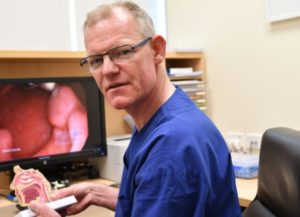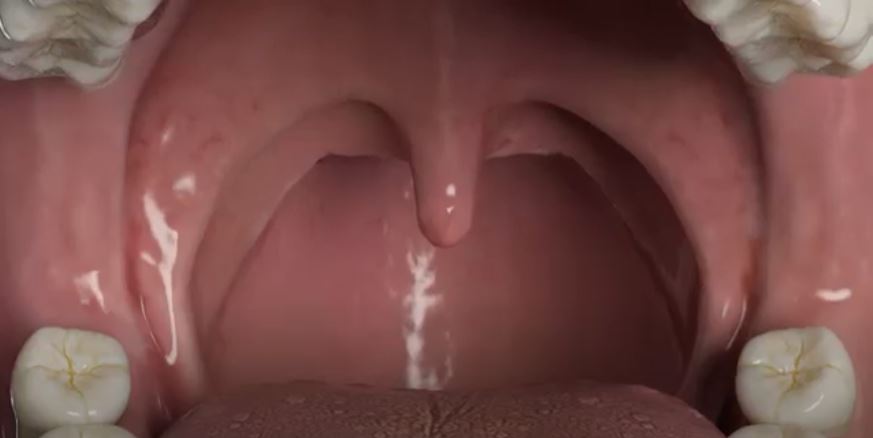A long-term study of patients who had upper airway surgery has confirmed the benefits for better management of moderate to severe sleep apnoea for people who failed to adapt or are not suited to continuous positive pressure airway (CPAP) therapy, say Flinders University and other experts.
Follow-up checks with 36 of the first 48 patients who had Sleep Apnoea Multi-Level Surgery (SAMS) - which involves repositioning the palate along with minimally invasive tongue volume reduction to increase upper airway flow - found consistently positive improvement in their sleep apnoea symptoms up to three years later, according to new research in Sleep journal.
Almost 1 billion people are living with diagnosed obstructive sleep apnoea (OSA) globally, with the main treatment CPAP tolerated by only about half of those who try it.
Almost 30% of people with OSA wake up very easily with light sleep and other problems caused by minor airway narrowing - with the condition likely to cause adverse consequences and potential comorbidities which could take years off their life if untreated or unmanaged.

"The benefits include less disrupted sleep and daytime drowsiness, less snoring in some cases and better general health, an important consideration given we know sleep loss can lead to diabetes, cardiovascular and stroke, obesity, depression and anxiety and other issues," says Professor Simon Carney, an ear, nose and throat (ENT) specialist at Flinders.
"It's very exciting to see so many patients who had the surgery getting a better night's sleep with reduced snoring that is likely to lead to fewer long-term health risks," says Professor Carney.
"Clarity about the long-term benefits of pharyngeal airway surgery is necessary because the alternative CPAP or a mandibular advancement splint are affected by usage, and real-life effectiveness of these therapies are often suboptimal.
"If patients receive inadequately treatment, their lifestyle is impacted and they are at risk of serious long-term morbidity."
Professor Carney says the selective use of this palate surgery can substantially reduce the number of night-time apnoea events without the need for CPAP machines which are often cumbersome to use and so not regularly used long-term or during travel while away from home.
 About half the 102 people recruited for the SAMS trial were randomly assigned the surgery while the rest continued to receive the best possible medical treatment.
About half the 102 people recruited for the SAMS trial were randomly assigned the surgery while the rest continued to receive the best possible medical treatment.
After six months, those who received the surgery had an approximate 60% decrease in the frequency of throat obstructions at night compared with a 20% decrease in participants who remained on medical treatment, and had major added improvements in snoring, daytime sleepiness and general health status.
After 2-3 years, the follow-up study found the surgical results remained stable despite concerns the expected benefits from the upper airway surgery would reduce over time.
The trial participants were recruited from six clinical centres in three Australian states (SA, NSW and WA) and were mainly overweight males with severe OSA who could not satisfactorily use standard medical treatments.
While some patients reported minor taste and swallow complaints after the surgery, most unanimously had an improved quality of life and a high level of satisfaction overall.
The paper, 'Sleep Apnea Multi-level Surgery (SAMS) Trial: Long-term Observational Outcomes' (2023) by Alison J Pinczel, Charmaine M Woods, Peter G Catcheside, Richard J Woodman, A Simon Carney, Ching Li Chai-Coetzer, Michael Chia, Peter A Cistulli, John-Charles Hodge, Andrew Jones, Matthew E Lam, Richard Lewis, Nigel McArdle, Eng H Ooi, Siobhan Clare Rea, Guy Rees, Bhajan Singh, Nicholas Stow, Aeneas Yeo, Nick Antic, R Doug McEvoy, Edward M Weaver and Stuart G Mackay has been accepted for publication in Sleep (Oxford Press) DOI: 10.1093/sleep/zsad218
Acknowledgements: The SAMS trial project has been funded by the Australian Government NHMRC (1059510), Flinders University, The Repat Foundation and Flinders Foundation. The current study will be funded by the Passe and Williams Foundation.

Professor Carney is now running further research to establish which patients are most likely to benefit from surgery. The study is part of a research led by Flinders FHMRI Sleep Health Professor Peter Catcheside to identify the site of airway collapse using minimally invasive technology and artificial intelligence.






